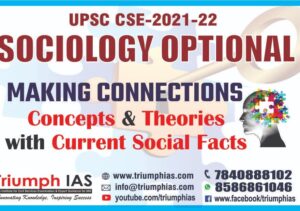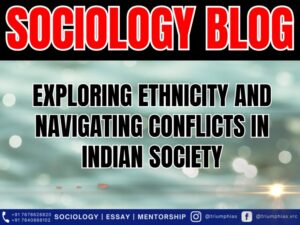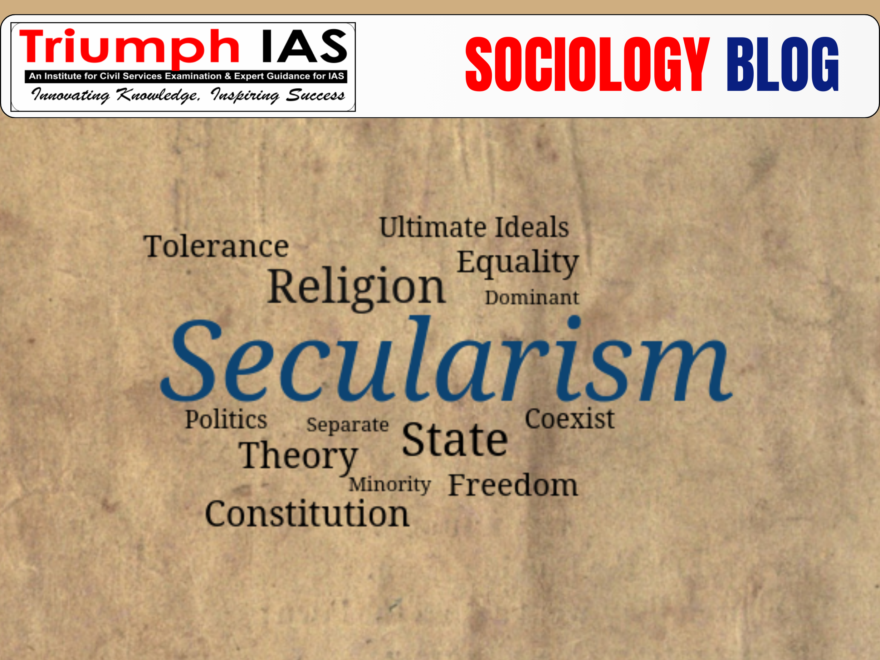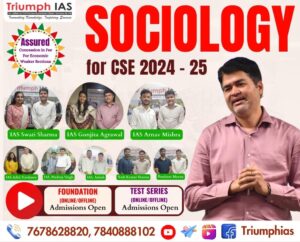Secularism
Relevant for Sociology Optional for Civil Service Examination.
Relevance : Sociology Paper -1 , Unit – Religion & Society
Secularism
Secularism emerged within the historical backdrop of diverse religious perspectives and intense conflicts arising from these differences. David Hume, in his “Dialogues Concerning Natural Religion” (1776), questioned the societal benefits of religion, pointing out its adverse consequences such as factions, civil wars, persecutions, government subversions, oppression, and slavery.

- The origins of modern secularism in Europe can be traced to the Crusades, seen as a response to the religious wars of the time. These holy wars, occurring between 1095 and 1464, aimed ostensibly to reclaim the holy lands in Palestine from Muslims. The pursuit of a way out of religious wars led to the development of two strategies to overcome religious hatred.
- The first strategy, known as the common ground approach, sought to establish ethical principles for peaceful coexistence and political order. Thinkers like Aquinas, Pufendorf, and Locke subscribed to this strategy, which downplayed confessional dogma, emphasized common beliefs, and could manifest in ideologies such as Deism. This approach aimed to unite people with different commitments around certain fundamental principles.
- The second strategy aimed to overcome religious conflicts by developing an independent political ethic. This approach proposed a political morality based on features of the human condition, with certain norms of peace and political obedience deduced from human rationality and sociability. Grotius is recognized as a pioneer of this strategy, asserting that even if God didn’t exist, these norms would be binding on humans.
- As an ideology, secularism encompasses five core ideas.
- Firstly, it emphasizes human autonomy, recognizing the individual’s right to order their life independently of authority. The Secular Humanist Declaration underscores trust in human intelligence rather than divine guidance, promoting a realistic approach where individuals are responsible for their destinies.
- Secondly, secularism asserts that not only the state and laws but also family relations, education, morality, knowledge, and values should be free from religious dominance.
- Marc Gallanter highlights in the Indian context that the goal is not to exclude religion from politics but to keep it out of social relations.
- Thirdly, secularism seeks the autonomy of reason, making reason the sole criterion of truth and challenging the authority of religion and the church.
- Fourthly, secularism promotes values of pluralism and religious toleration by acknowledging that no religion is final, infallible, or beyond rational scrutiny. Secularists consider a plurality of religious worldviews as natural, valuing an attitude of tolerance towards other religions and value systems.
- Finally, secularism is not anti-religious; instead, it focuses on the affairs of this world, considering secular life and knowledge as autonomous. The People’s Republic of China, with its official policy against religion, aligns with the definition of secularism, though it may not be considered a strictly secular state.
Reference: Static Portion
Related Blogs…
 |
 |
Frequently Asked Questions:
1. Question: Define the term “ethnic movement” and provide an example from India.
Answer: An ethnic movement refers to a collective effort by a group sharing common cultural, linguistic, or religious traits, seeking to assert their identity and rights; an example from India is the Khalistan Movement in Punjab.
2. Question: Identify the main objectives behind the Gorkhaland ethnic movement.
Answer: The Gorkhaland ethnic movement primarily seeks to establish a separate state for India’s Nepali-speaking population in the Darjeeling region, advocating for linguistic and cultural recognition and political autonomy.
3. Question: What was the Operation Blue Star, and which ethnic movement was it related to?
Answer: Operation Blue Star was a military action in 1984, aiming to remove Sikh militants hiding in the Golden Temple in Amritsar; it is related to the Khalistan movement, which sought a separate Sikh country.
4. Question: Mention a critical factor that triggered the emergence of ethnic movements in India, as discussed by Dipankar Gupta.
Answer: Dipankar Gupta emphasized that ethnicity is fundamentally a political process, wherein caste and religion, the key components of identity formation, are politicized by leaders for vested interests.
5. Question: What were the primary reasons for the Assam Ethnicity conflicts involving Bodo tribals and Bengali Muslim settlers?
Answer: The Assam Ethnicity conflicts primarily stemmed from issues related to immigration, land rights, and resource allocation, leading to clashes, riots, and evolving relationships among indigenous communities to address challenges.
6. Question: Briefly describe the role of the Dravidian Movement in terms of caste and societal structure.
Answer: The Dravidian Movement, led notably by E.V. Ramasamy, aimed to establish an egalitarian society, focusing on anti-Brahmanism and advocating for equal rights for backward castes, while also introducing reforms like self-respect marriages.
7. Question: Name the prominent ethnic movements in North-East India and specify one common objective.
Answer: Prominent ethnic movements in North-East India include the Nagas’ and Mizos’ struggles; a common objective was to gain autonomy and recognition for their distinct tribal identities and cultural uniqueness.
8. Question: What is the key argument of Gail Omveldt regarding traditional Indian society and multiculturalism?
Answer: Gail Omveldt opposed romanticizing traditional Indian society, arguing that hierarchy has always dominated it and dismissing the notion that multiculturalism is an intrinsic feature of Indian society as a myth.
9. Question: Briefly explain the social hierarchy factor as a contributing element to ethnic movements as suggested by Olzak.
Answer: Olzak suggests that the construction of hierarchies among ethnic communities, which often leads to the suppression of one group by another, is a key factor that can instigate social and ethnic movements.
10. Question: Identify one consequence of the unequal economic development factor within the context of ethnic movements in India.
Answer: One consequence of unequal economic development is the marginalization and underdevelopment of certain groups, leading to feelings of alienation and sometimes initiating ethnic movements as these groups strive for equality and recognition.
GS Related Practices Questions…
To master these intricacies and fare well in the Sociology Optional Syllabus, aspiring sociologists might benefit from guidance by the Best Sociology Optional Teacher and participation in the Best Sociology Optional Coaching. These avenues provide comprehensive assistance, ensuring a solid understanding of sociology’s diverse methodologies and techniques.
META TAGS:
Ethnic Movements, ethnic movements in india, ethnic movement in sociology, Punjab Movement, North-East Ethnic Movements, Gorkhaland Movement, Dravidian Movement, Assam Ethnicity, Ethnic Conflicts, Sociopolitical Impact, India, Ethnic Consciousness, Ethnic Rights, Political Crisis, Economic Development, Cultural Disparities, Khalistan Movement, Nagaland, Mizoram, Multiculturalism, Political Economy, Identity Formation, Social Hierarchies, Bodo Tribals, Bengali Muslim Settlers, Anti-Sikh Riots, Operation Blue Star, Unequal Development, Ethnic Violence, Political Mobilization

Why Vikash Ranjan’s Classes for Sociology?
Proper guidance and assistance are required to learn the skill of interlinking current happenings with the conventional topics. VIKASH RANJAN SIR at TRIUMPH IAS guides students according to the Recent Trends of UPSC, making him the Best Sociology Teacher for Sociology Optional UPSC.
At Triumph IAS, the Best Sociology Optional Coaching platform, we not only provide the best study material and applied classes for Sociology for IAS but also conduct regular assignments and class tests to assess candidates’ writing skills and understanding of the subject.
Choose The Best Sociology Optional Teacher for IAS Preparation?
At the beginning of the journey for Civil Services Examination preparation, many students face a pivotal decision – selecting their optional subject. Questions such as “which optional subject is the best?” and “which optional subject is the most scoring?” frequently come to mind. Choosing the right optional subject, like choosing the best sociology optional teacher, is a subjective yet vital step that requires a thoughtful decision based on facts. A misstep in this crucial decision can indeed prove disastrous.
Ever since the exam pattern was revamped in 2013, the UPSC has eliminated the need for a second optional subject. Now, candidates have to choose only one optional subject for the UPSC Mains, which has two papers of 250 marks each. One of the compelling choices for many has been the sociology optional. However, it’s strongly advised to decide on your optional subject for mains well ahead of time to get sufficient time to complete the syllabus. After all, most students score similarly in General Studies Papers; it’s the score in the optional subject & essay that contributes significantly to the final selection.
“A sound strategy does not rely solely on the popular
Opinion of toppers or famous YouTubers cum teachers.”
It requires understanding one’s ability, interest, and the relevance of the subject, not just for the exam but also for life in general. Hence, when selecting the best sociology teacher, one must consider the usefulness of sociology optional coaching in General Studies, Essay, and Personality Test.
The choice of the optional subject should be based on objective criteria, such as the nature, scope, and size of the syllabus, uniformity and stability in the question pattern, relevance of the syllabic content in daily life in society, and the availability of study material and guidance. For example, choosing the best sociology optional coaching can ensure access to top-quality study materials and experienced teachers. Always remember, the approach of the UPSC optional subject differs from your academic studies of subjects. Therefore, before settling for sociology optional, you need to analyze the syllabus, previous years’ pattern, subject requirements (be it ideal, visionary, numerical, conceptual theoretical), and your comfort level with the subject.
This decision marks a critical point in your UPSC – CSE journey, potentially determining your success in a career in IAS/Civil Services. Therefore, it’s crucial to choose wisely, whether it’s the optional subject or the best sociology optional teacher. Always base your decision on accurate facts, and never let your emotional biases guide your choices. After all, the search for the best sociology optional coaching is about finding the perfect fit for your unique academic needs and aspirations.
To master these intricacies and fare well in the Sociology Optional Syllabus, aspiring sociologists might benefit from guidance by the Best Sociology Optional Teacher and participation in the Best Sociology Optional Coaching. These avenues provide comprehensive assistance, ensuring a solid understanding of sociology’s diverse methodologies and techniques. Sociology, Social theory, Best Sociology Optional Teacher, Best Sociology Optional Coaching, Sociology Optional Syllabus.
Best Sociology Optional Teacher, Sociology Syllabus, Sociology Optional, Sociology Optional Coaching, Best Sociology Optional Coaching, Best Sociology Teacher, Sociology Course, Sociology Teacher, Sociology Foundation, Sociology Foundation Course, Sociology Optional UPSC, Sociology for IAS,
Follow us :
🔎 https://www.instagram.com/triumphias
🔎https://www.youtube.com/c/TriumphIAS
🔎https://t.me/VikashRanjanSociology
Find More Blogs…
| Compare and contrast Karl Marx’s and Max weber’s | Karl Marx- Historical Materialism |
| Talcott Parsons : Social system | Scope of the subject and comparison with other social sciences |
KEYWORD: Secularism,Secularism,Secularism,Secularism,Secularism,Secularism,Secularism,Secularism,Secularism,Secularism,Secularism,Secularism,Secularism,Secularism,Secularism,Secularism,Secularism,Secularism,Secularism,Secularism,Secularism,Secularism,Secularism,Secularism,Secularism,Secularism,Secularism,Secularism,Secularism,



One comment